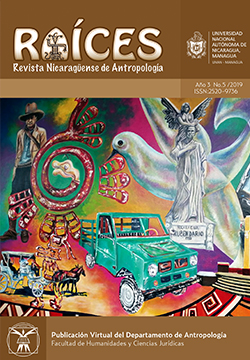Roots of the Sandinista revolution: Sandino’s epistemological bases
DOI:
https://doi.org/10.5377/raices.v3i5.8798Keywords:
Anthropology, Episteme, Anticolonialism, Anti-imperialism, Community Cooperativism, Revolution, Restitution of RightsAbstract
On July 19, 2019, the people of Nicaragua commemorate forty years of the momentous triumph of the Sandinista Popular Revolution, the most beautiful Sociocultural Anthropological Project based on the Episteme de AC Sandino, based on anti-colonialism, anti-imperialism, nationalism and community cooperativism, libertarian, emancipator, firm in the defense of the sovereignty of the homeland and of the peace that is not that of the slave; but the one that dignifies an entire people. Sandino builds his own scientific episteme, which takes up the thoughts of Diriangén, Tomás Ruiz, Benjamín Zeledón and Rubén Darío. Sandino inherits a free Nicaragua from the invading Marines and from his heroic deed a new Popular Revolution will be born, forged in the delivery of the legitimate children of Nicaragua as Rigoberto who offered his conscious life that his patriotic action would be the Beginning of the End of the Dictatorship , Comandante Carlos Fonseca, who founded the Sandinista National Liberation Front to lead the struggle of an entire town until reaching the final victory and Commander Daniel Ortega Saavedra, Darian Caupolicán, carrying the sturdy tree trunk on the shoulder of a titan; it has carried the Sandinista Popular Revolution on its shoulders until it germinates and flourishes in this Nicaragua that, as a result of the Great National Literacy Crusade, is no longer illiterate, but a progressive, decolonized, anti imperialist nation; where the restitution of social and cultural rights are finally a reality for everyone.
Downloads
905
Downloads
Published
How to Cite
Issue
Section
License
This license enables reusers to distribute, remix, adapt, and build upon the material in any medium or format for noncommercial purposes only, and only so long as attribution is given to the creator. If you remix, adapt, or build upon the material, you must license the modified material under identical terms.




